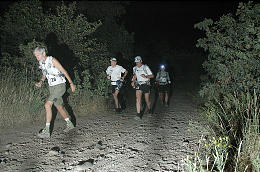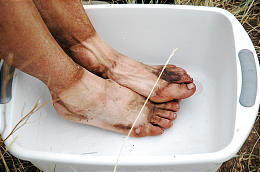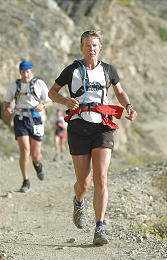|
Wasatch 100 — The question seemed innocuous enough, but it offended 55-year-old Dan Brenden.  Runners compete in Wasatch 100 endurance run this past week. The race is physically and mentally challenging for runners. Every athlete who ventures into ultra running has different reasons for doing so. For Catra Corbett, it was a way to beat an addiction to drugs. For Karl Meltzer, it seemed a natural progression from marathons to endurance races. For Diane Van Deren, it was a way to continue to make money as a professional athlete, even after three children, 10 years of seizures and brain surgery. "It's the challenge thing," said Meltzer, 38, who won the Wasatch 100 last weekend and owns the course record. He's currently pursuing another record in the Rocky Mountain Grand Slam. "As you get older, you get slower; so you just go farther." Ultra running doesn't seem like a sport with mass appeal, but the sport is growing in popularity, and there are nearly three dozen 100-mile races in the United States alone. Brenden's finish in the Wasatch 100 last weekend was his ninth finish this year. He can't even count how many ultra races he's competed in, but he does know what his record is. "I've never dropped out of a race in my life," Brenden said. "I have a mental edge in the rest of my life now. (Ultra running) becomes part of your life; it shapes your life." Most ultra runners get emotional when talking about why they push their minds and bodies past the point of all reason. Often, they say, they can't find the words to describe it, to do it justice. "I don't think there is just one reason for anybody," Brenden said. "It's just a fulfilling, emotional experience."  A runner soaks his feet during the Wasatch 100. For Corbett, it was drugs. "I spent one night in jail, and I was literally scared straight," said the California woman who has completed 250 ultra marathons, including 44 100-mile races. "Things happen for a reason, and I don't think I would have gotten into this without getting into trouble. I got a diversion and I cleaned up my life." She became a vegan and began exercising. Friends got her into running, and it became her new drug. "It was a healthy addiction," she said. "It's challenging and I love the people." She secured a sponsor and now spends her life trying to prepare for and then conquer her next goal. "I plan on running the rest of my life," she said. "Anybody can do whatever it is they want. Who am I? I'm nobody special. If you want to do something, you can. It's mental." Van Deren, of Colorado, now makes a living running ultra marathons, something some may have thought impossible a few years go. A former tennis pro, she began having grand mal seizures two weeks into her third pregnancy. For 10 years she couldn't drive and could barely bathe without supervision because the seizures were so frequent and debilitating. Then she had brain surgery that stopped the seizures. "Whenever I had a premonition that I was going to have a seizure, I'd put on my tennis shoes and head off on a mountain trail," she said. "I never had a seizure while I was running, so the mountains became my safe spot."  Diane Van Deren of Colorado competes. She makes a living running ultra marathons.
She was recently honored on the Today show for her accomplishments and speaks to other women in hopes of sharing her message. "My legs are my words," she said. "Everybody has trials. Mine was epilepsy, but you can get through those tough things." For many runners, it's setting a goal and reaching it even after doubt and fatigue nearly steal it from you. Most ultra runners are older athletes, although much of the new growth is in the 20-something age division. There were many theories about why that is, but one man's observation was that as you get older, you get more mentally tough. Brenden believes there is something to that. He knows that challenges come at all times, to all people. He was in a ski accident that left him in a coma nine years ago so severe that his family contemplated shutting off his life support. His girlfriend of 10 years, Hugette White, lost her leg to Ewing's sarcoma as a teenage girl. Last summer he was lost for 22 hours in the Egyptian desert when he went off course on a 220-mile run. "There are a lot of challenges in a job, in life," he said. "But I know I can outlast them. It may take a long time, but I know I'm going to win eventually." And in ultra running, winning is finishing the race. E-mail: adonaldson@desnews.com |
